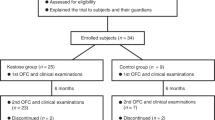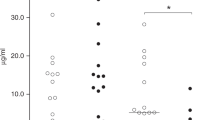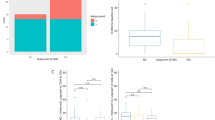Abstract
Background
In children with an allergy to cow’s milk proteins (CMA), the altered composition of intestinal microbiota influences the immune tolerance to milk proteins (CMP). This study aims to investigate the effect of probiotics on the phenotype and activation status of peripheral basophils and lymphocytes in a pediatric CMA cohort.
Methods
CMA children underwent 45 days of treatment with Bifidobacteria. The basophil degranulation and the immune phenotype of B cells, T helper cells, and regulatory T cells were analyzed in peripheral blood at diagnosis (T0), after a 45-day probiotic treatment (T1), and 45 days after the probiotic wash-out (T2).
Results
We observed in probiotic-treated CMA patients a decrease in naive T lymphocytes. Among the CD3+ cell subsets, both naive and activated CD4+ cells resulted markedly reduced after taking probiotics, with the lowest percentages at T2. A decreased basophil degranulation was observed in response to all analyzed CMP at T1 compared to T0.
Conclusions
The probiotic treatment resulted in a decrease of circulating naive and activated CD4+ T cells, as well as degranulating basophils. These data suggest that the Bifidobacteria could have a beneficial effect in the modulation of oral tolerance to CMP.
Trial registration
ISRCTN69069358. URL of registration: https://www.isrctn.com/ISRCTN69069358.
Impact
-
Probiotic treatment with Bifidobacteria induces a reduction of both naive and activated circulating CD4+ T cells in pediatric patients with cow’s milk allergy (CMA).
-
The probiotic supplementation induces a decreased basophil degranulation.
-
The immunological tolerance persists even after 45 days of the probiotic wash-out.
-
Bifidobacteria in vivo supplementation down-modulates the activation of innate and adaptive immunity in pediatric patients with cow’s milk allergy.
-
Bifidobacteria contribute to the development of immune tolerance in CMA patients.
This is a preview of subscription content, access via your institution
Access options
Subscribe to this journal
Receive 14 print issues and online access
$259.00 per year
only $18.50 per issue
Buy this article
- Purchase on Springer Link
- Instant access to full article PDF
Prices may be subject to local taxes which are calculated during checkout



Similar content being viewed by others
Data availability
The datasets generated during and/or analyzed during the study will be available upon request to the authors.
References
Boyce, J. A. et al. Guidelines for the Diagnosis and Management of Food Allergy in the United States: Summary of the NIAID-Sponsored Expert Panel Report. J. Allergy Clin. Immunol. 126, 1105–1118 (2010).
Sicherer, S. H. Epidemiology of food allergy. J. Allergy Clin. Immunol. 127, 594–602 (2011).
Høst, A. et al. Clinical course of cow’s milk protein allergy/intolerance and atopic diseases in childhood. Pediatr. Allergy Immunol. 13, 23–28 (2002).
Basturk, A., Isik, İ., Atalay, A. & Yılmaz, A. Investigation of the efficacy of Lactobacillus rhamnosus GG in infants with cow’s milk protein allergy: a randomised double-blind placebo-controlled trial. Probiotics Antimicrob. Proteins 12, 138–143 (2020).
Clemente, J. C., Ursell, L. K., Parfrey, L. W. & Knight, R. The impact of the gut microbiota on human health: an integrative view. Cell 148, 1258–1270 (2012).
Nakayama, J. et al. Aberrant structures of fecal bacterial community in allergic infants profiled by 16S rRNA gene pyrosequencing. FEMS Immunol. Med. Microbiol. 63, 397–406 (2011).
Plunkett, C. H. & Nagler, C. R. The influence of the microbiome on allergic sensitization to food. J. Immunol. 198, 581–589 (2017).
Osborn, D. A. & Sinn, J. K. Probiotics in infants for prevention of allergic disease and food hypersensitivity. Cochrane Database Syst. Rev. 17, CD006475 (2007).
Boyle, R. J., Bath-Hextall, F. J., Leonardi-Bee, J., Murrell, D. F. & Tang, M. L.-K. Probiotics for the treatment of eczema: a systematic review. Clin. Exp. Allergy 39, 1117–1127 (2009).
Martínez-Cañavate, A. et al. A probiotic dairy product containing L. gasseri CECT5714 and L. coryniformis CECT5711 induces immunological changes in children suffering from allergy. Pediatr. Allergy Immunol. 20, 592–600 (2009).
Vliagoftis, H., Kouranos, V. D., Betsi, G. I. & Falagas, M. E. Probiotics for the treatment of allergic rhinitis and asthma: systematic review of randomized controlled trials. Ann. Allergy Asthma Immunol. 101, 570–579 (2008).
Peluso, I. et al. Lactobacillus paracasei subsp. paracasei B21060 suppresses human T-cell proliferation. Infect. Immun. 75, 1730–1737 (2007).
Majamaa, H. & Isolauri, E. Probiotics: a novel approach in the management of food allergy. J. Allergy Clin. Immunol. 99, 179–185 (1997).
Viljanen, M. et al. Probiotic effects on faecal inflammatory markers and on faecal IgA in food allergic atopic eczema/dermatitis syndrome infants. Pediatr. Allergy Immunol. 16, 65–71 (2005).
Sackesen, C. et al. Current trends in tolerance induction in cow’s milk allergy: from passive to proactive strategies. Front. Pediatr. 7, 372 (2019).
Nucera, E. et al. Utility of basophil activation test for monitoring the acquisition of clinical tolerance after oral desensitization to cow’s milk: pilot study. U. Eur. Gastroenterol. J. 3, 272–276 (2015).
Berni Canani, R. et al. Effect of Lactobaccillus GG on tollerance acquisition in infants with cow’s milk allergy: a randomized trial. J. Allergy Clin. Immunol. 129, 580–582.e5 (2012).
Camarca, A. et al. Human peripheral blood mononuclear cell function and dendritic cell differentiation are affected by bisphenol-A exposure. PLoS ONE 11, e0161122 (2016).
Bates, D., Mächler, M., Bolker, B. & Walker, S. Fitting linear mixed-effects models using lme4. J. Stat. Softw. 67, 1–48 (2015).
Strisciuglio, C. et al. Bifidobacteria enhance antigen sampilng and processing by dendtritic cells in pediatric inflammatory bowel disease. Inflamm. Bowel Dis. 21, 1491–1498 (2015).
Fiorentini, S. et al. CD11b expression identifies CD8+CD28+ T lymphocytes with phenotype and function of both naive/memory and effector cells. J. Immunol. 166, 900–907 (2001).
Järvinen, K. M., Aro, A., Juntunen-Backman, K. & Suomalainen, H. Large number of CD19+/CD23+ B cells and small number of CD8+ T cells as early markers for cow’s milk allergy (CMA). Pediatr. Allergy Immunol. 9, 139–142 (1998).
Perezabad, L. et al. The establishment of cow’s milk protein allergy in infants is related with a deficit of regulatory T cells (Treg) and vitamin D. Pediatr. Res. 81, 722–730 (2017).
Mowat, A. M. The regulation of immune responses to dietary protein antigens. Immunol. Today 8, 93–98 (1987).
Suomalainen, H., Soppi, E., Laine, S. & Isolauri, E. Immunologic disturbances in cow’s milk allergy, 2: evidence for defective interferon-gamma generation. Pediatr. Allergy Immunol. 4, 203–207 (1993).
Huber, M. & Lohoff, M. Change of paradigm: CD8+ T cells as important helper for CD4+ T cells during asthma and autoimmune encephalomyelitis. Allergo J. Int. 24, 8–15 (2015).
Osterlund, P. & Suomalainen, H. Low frequency of CD4+, but not CD8+, T cells expressing interferon-gamma is related to cow’s milk allergy in infancy. Pediatr. Allergy Immunol. 13, 262–268 (2002).
Curotto de Lafaille, M. A. et al. Adaptive Foxp3+ regulatory T cell-dependent and -independent control of allergic inflammation. Immunity 29, 114–126 (2008).
Hol, J. et al. The acquisition of tolerance toward cow’s milk through probiotic supplementation: a randomized, controlled trial. J. Allergy Clin. Immunol. 121, 1448–1454 (2008).
Ciepiela, O. et al. Basophil activation test based on the expression of CD203c in the diagnostics of cow milk allergy in children. Eur. J. Med. Res. 15, 21–26 (2010).
Hemmings, O., Kwok, M., McKendry, R. & Santos, A. F. Basophil activation test: old and new applications in allergy. Curr. Allergy Asthma Rep. 18, 77 (2018).
Shreffler, W. G. Evaluation of basophil activation in food allergy: present and future applications. Curr. Opin. Allergy Clin. Immunol. 6, 226–233 (2006).
Author information
Authors and Affiliations
Contributions
C.S. and A.V. contributed to the conception and design of the study, sample collection, analysis and interpretation of data, and drafted the article; F.P. performed the BAT experiments; F.G. contributed to sample collection and performed BAT experiments. P.D. performed the statistical and correlation analysis; S.V., T.M., and F.O. contributed to sample collection and analysis; M.M.d.G. contributed to the conception, design, and intellectual content of the study; G.M. and C.G. contributed to the conception, design and intellectual content of the study, revised the data, and drafted the article.
Corresponding author
Ethics declarations
Competing interests
The authors declare that the research was conducted in the absence of any commercial or financial relationships that could be construed as a potential conflict of interest.
Ethics approval and consent to participate
The study was approved by the Institutional Review Board of the University of Campania “Luigi Vanvitelli” (registration number 07/2016). Written informed consent for participation in the study and publishing of individual patient data were obtained from the parents of all children.
Additional information
Publisher’s note Springer Nature remains neutral with regard to jurisdictional claims in published maps and institutional affiliations.
Rights and permissions
Springer Nature or its licensor (e.g. a society or other partner) holds exclusive rights to this article under a publishing agreement with the author(s) or other rightsholder(s); author self-archiving of the accepted manuscript version of this article is solely governed by the terms of such publishing agreement and applicable law.
About this article
Cite this article
Strisciuglio, C., Vitale, A., Perna, F. et al. Bifidobacteria modulate immune response in pediatric patients with cow’s milk protein allergy. Pediatr Res 94, 1111–1118 (2023). https://doi.org/10.1038/s41390-023-02534-0
Received:
Accepted:
Published:
Issue Date:
DOI: https://doi.org/10.1038/s41390-023-02534-0



